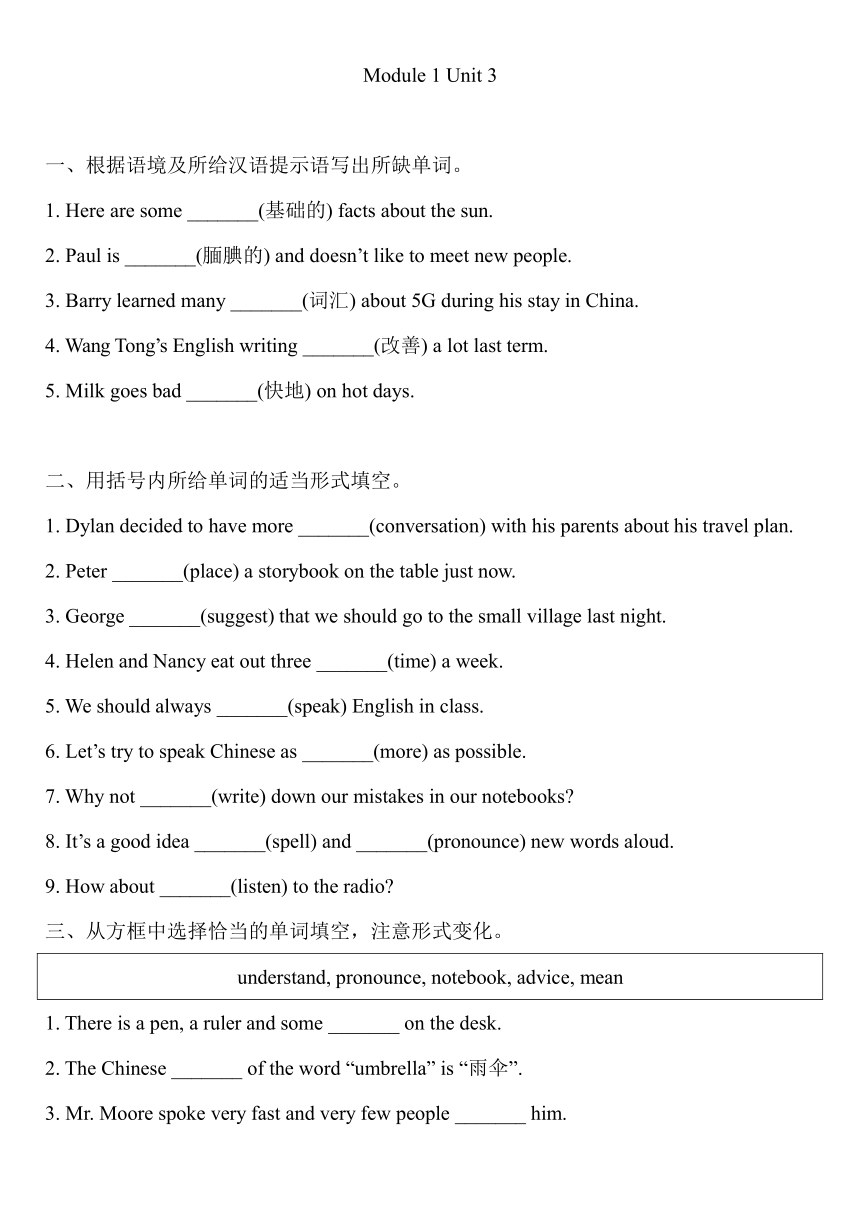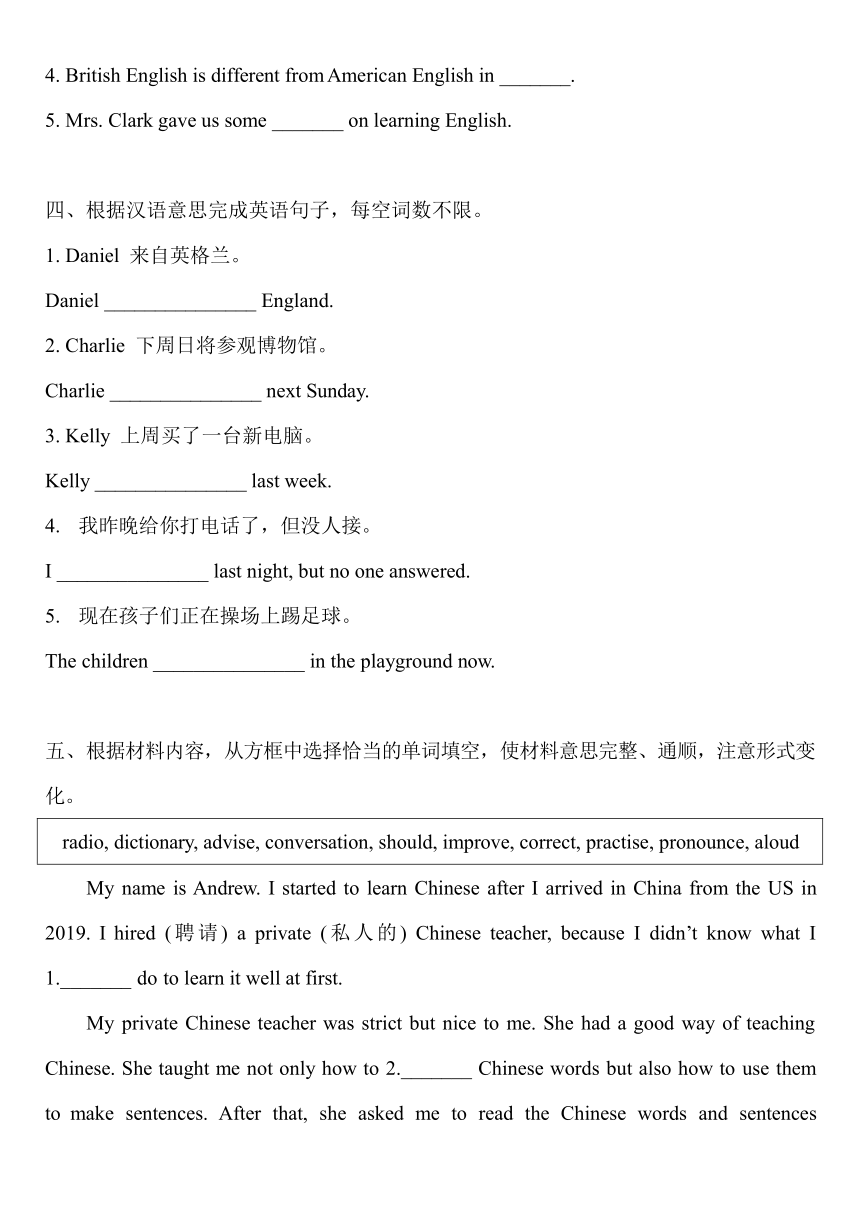Module 1 How to learn English? Unit 3 复习练习题(含答案)2024-2025学年外研版八年级英语上册
文档属性
| 名称 | Module 1 How to learn English? Unit 3 复习练习题(含答案)2024-2025学年外研版八年级英语上册 |

|
|
| 格式 | docx | ||
| 文件大小 | 31.4KB | ||
| 资源类型 | 教案 | ||
| 版本资源 | 外研版 | ||
| 科目 | 英语 | ||
| 更新时间 | 2024-09-07 00:00:00 | ||
图片预览


文档简介
Module 1 Unit 3
一、根据语境及所给汉语提示语写出所缺单词。
1. Here are some _______(基础的) facts about the sun.
2. Paul is _______(腼腆的) and doesn’t like to meet new people.
3. Barry learned many _______(词汇) about 5G during his stay in China.
4. Wang Tong’s English writing _______(改善) a lot last term.
5. Milk goes bad _______(快地) on hot days.
二、用括号内所给单词的适当形式填空。
1. Dylan decided to have more _______(conversation) with his parents about his travel plan.
2. Peter _______(place) a storybook on the table just now.
3. George _______(suggest) that we should go to the small village last night.
4. Helen and Nancy eat out three _______(time) a week.
5. We should always _______(speak) English in class.
6. Let’s try to speak Chinese as _______(more) as possible.
7. Why not _______(write) down our mistakes in our notebooks
8. It’s a good idea _______(spell) and _______(pronounce) new words aloud.
9. How about _______(listen) to the radio
三、从方框中选择恰当的单词填空,注意形式变化。
understand, pronounce, notebook, advice, mean
1. There is a pen, a ruler and some _______ on the desk.
2. The Chinese _______ of the word “umbrella” is “雨伞”.
3. Mr. Moore spoke very fast and very few people _______ him.
4. British English is different from American English in _______.
5. Mrs. Clark gave us some _______ on learning English.
四、根据汉语意思完成英语句子,每空词数不限。
1. Daniel 来自英格兰。
Daniel _______________ England.
2. Charlie 下周日将参观博物馆。
Charlie _______________ next Sunday.
3. Kelly 上周买了一台新电脑。
Kelly _______________ last week.
4. 我昨晚给你打电话了,但没人接。
I _______________ last night, but no one answered.
5. 现在孩子们正在操场上踢足球。
The children _______________ in the playground now.
五、根据材料内容,从方框中选择恰当的单词填空,使材料意思完整、通顺,注意形式变化。
radio, dictionary, advise, conversation, should, improve, correct, practise, pronounce, aloud
My name is Andrew. I started to learn Chinese after I arrived in China from the US in 2019. I hired (聘请) a private (私人的) Chinese teacher, because I didn’t know what I 1._______ do to learn it well at first.
My private Chinese teacher was strict but nice to me. She had a good way of teaching
Chinese. She taught me not only how to 2._______ Chinese words but also how to use them to make sentences. After that, she asked me to read the Chinese words and sentences 3._______ again and again. When I made mistakes, she helped me to 4._______ them. She also suggested that I watch Chinese TV programmes or listen to Chinese news on the 5._______.
I also made some Chinese friends. They were very kind and often gave me lots of good
6._______ on how to learn Chinese well. They asked me to 7._______ speaking Chinese with them.
With the help of my private Chinese teacher and my Chinese friends, I 8._______ my
Chinese a lot in just one and a half years. Now I can use Chinese to have 9._______ with Chinese people. And with a Chinese 10._______ in my hands, I can read Chinese articles (文章) in different kinds of newspapers and magazines.
六、假如你的好朋友在英语听力方面有困难,你认为下列建议中哪些能够帮助他/她提高英语听力呢?
A. watch English movies
B. write new words in the notebook
C. read as many English books as you can
D. listen to English news (新闻) like VOA and BBC
____________________________________________________________________________
你还能想到其他建议吗?(至少两条)
____________________________________________________________________________
____________________________________________________________________________
答案:
一、
1. basic
2. Shy
3. vocabularies
4. improved
5. Quickly
二、
1. conversations
2. Placed
3. suggested
4. times
5. speak
6. much
7. write
8. to spell pronounce
9. listening
三、
1. notebooks
2. meaning
3. understood
4. pronunciation
5. advice
四、
1. is / comes from
2. will / is going to visit the museum
3. bought a new computer
4. called you / gave you a call
5. are playing football
五、
1. should
2. pronounce
3. aloud
4. Correct
5. radio
6. advice
7. practice
8. Improved
9. conversations
10. dictionary
六、
AD
1. It’s a good idea to watch English TV programmes.
2. You can listen to English songs.
一、根据语境及所给汉语提示语写出所缺单词。
1. Here are some _______(基础的) facts about the sun.
2. Paul is _______(腼腆的) and doesn’t like to meet new people.
3. Barry learned many _______(词汇) about 5G during his stay in China.
4. Wang Tong’s English writing _______(改善) a lot last term.
5. Milk goes bad _______(快地) on hot days.
二、用括号内所给单词的适当形式填空。
1. Dylan decided to have more _______(conversation) with his parents about his travel plan.
2. Peter _______(place) a storybook on the table just now.
3. George _______(suggest) that we should go to the small village last night.
4. Helen and Nancy eat out three _______(time) a week.
5. We should always _______(speak) English in class.
6. Let’s try to speak Chinese as _______(more) as possible.
7. Why not _______(write) down our mistakes in our notebooks
8. It’s a good idea _______(spell) and _______(pronounce) new words aloud.
9. How about _______(listen) to the radio
三、从方框中选择恰当的单词填空,注意形式变化。
understand, pronounce, notebook, advice, mean
1. There is a pen, a ruler and some _______ on the desk.
2. The Chinese _______ of the word “umbrella” is “雨伞”.
3. Mr. Moore spoke very fast and very few people _______ him.
4. British English is different from American English in _______.
5. Mrs. Clark gave us some _______ on learning English.
四、根据汉语意思完成英语句子,每空词数不限。
1. Daniel 来自英格兰。
Daniel _______________ England.
2. Charlie 下周日将参观博物馆。
Charlie _______________ next Sunday.
3. Kelly 上周买了一台新电脑。
Kelly _______________ last week.
4. 我昨晚给你打电话了,但没人接。
I _______________ last night, but no one answered.
5. 现在孩子们正在操场上踢足球。
The children _______________ in the playground now.
五、根据材料内容,从方框中选择恰当的单词填空,使材料意思完整、通顺,注意形式变化。
radio, dictionary, advise, conversation, should, improve, correct, practise, pronounce, aloud
My name is Andrew. I started to learn Chinese after I arrived in China from the US in 2019. I hired (聘请) a private (私人的) Chinese teacher, because I didn’t know what I 1._______ do to learn it well at first.
My private Chinese teacher was strict but nice to me. She had a good way of teaching
Chinese. She taught me not only how to 2._______ Chinese words but also how to use them to make sentences. After that, she asked me to read the Chinese words and sentences 3._______ again and again. When I made mistakes, she helped me to 4._______ them. She also suggested that I watch Chinese TV programmes or listen to Chinese news on the 5._______.
I also made some Chinese friends. They were very kind and often gave me lots of good
6._______ on how to learn Chinese well. They asked me to 7._______ speaking Chinese with them.
With the help of my private Chinese teacher and my Chinese friends, I 8._______ my
Chinese a lot in just one and a half years. Now I can use Chinese to have 9._______ with Chinese people. And with a Chinese 10._______ in my hands, I can read Chinese articles (文章) in different kinds of newspapers and magazines.
六、假如你的好朋友在英语听力方面有困难,你认为下列建议中哪些能够帮助他/她提高英语听力呢?
A. watch English movies
B. write new words in the notebook
C. read as many English books as you can
D. listen to English news (新闻) like VOA and BBC
____________________________________________________________________________
你还能想到其他建议吗?(至少两条)
____________________________________________________________________________
____________________________________________________________________________
答案:
一、
1. basic
2. Shy
3. vocabularies
4. improved
5. Quickly
二、
1. conversations
2. Placed
3. suggested
4. times
5. speak
6. much
7. write
8. to spell pronounce
9. listening
三、
1. notebooks
2. meaning
3. understood
4. pronunciation
5. advice
四、
1. is / comes from
2. will / is going to visit the museum
3. bought a new computer
4. called you / gave you a call
5. are playing football
五、
1. should
2. pronounce
3. aloud
4. Correct
5. radio
6. advice
7. practice
8. Improved
9. conversations
10. dictionary
六、
AD
1. It’s a good idea to watch English TV programmes.
2. You can listen to English songs.
同课章节目录
- Module 1 How to learn English
- Unit 1 Let's try to speak English as much as possi
- Unit 2 You should smile at her.
- Unit 3 Language in use .
- Module 2 My home town and my country
- Unit 1 It's taller than many other buildings.
- Unit 2 Cambridge is a beautiful city in the east o
- Unit 3 Language in use .
- Module 3 Sports.
- Unit 1 Nothing is more exciting than playing tenni
- Unit 2 This year we training more carefully.
- Unit 3 Language in use .
- Module 4 Planes, ships and trains .
- Unit 1 He lives the farthest from school.
- Unit 2 What is the best way to travel.
- Unit 3 Language in use .
- Module 5 Lao She Teahouse.
- Unit 1 I wanted to see the Beijing Opera.
- Unit 2 It descibes the changes in Chinese society.
- Unit 3 Language in use .
- Module 6 Animals in danger.
- Unit 1 It allows people to get closer to them .
- Unit 2 The WWF is working hard to save them all.
- Unit 3 Language in use .
- Revision module A
- Module 7 A famous story
- Unit 1 Alice was sitting with her sister by the ri
- Unit 2 She was thinking about her cat.
- Unit 3 Language in use .
- Module 8 Accidents
- Unit 1 While the car were changing to red, a car s
- Unit 2 I was trying to pick it up when it bite me
- Unit 3 Language in use .
- Module 9 Population
- Unit 1 The population of China is about 1.37 billi
- Unit 2 Arnwick was a city with 200,000 people.
- Unit 3 Language in use .
- Module 10 The weathe
- Unit 1 It might snow.
- Unit 2 The weather is fine all year round.
- Unit 3 Language in use .
- Module 11 Way of life
- Unit 1 In China ,we open a gift later.
- Unit 2 In England, you usually drink tea with milk
- Unit 3 Language in use .
- Module 12 Help
- Unit 1 What should we do before help arrives?
- Unit 2 Stay away from windows and heavy furniture.
- Unit 3 Language in use .
- Revision module B
